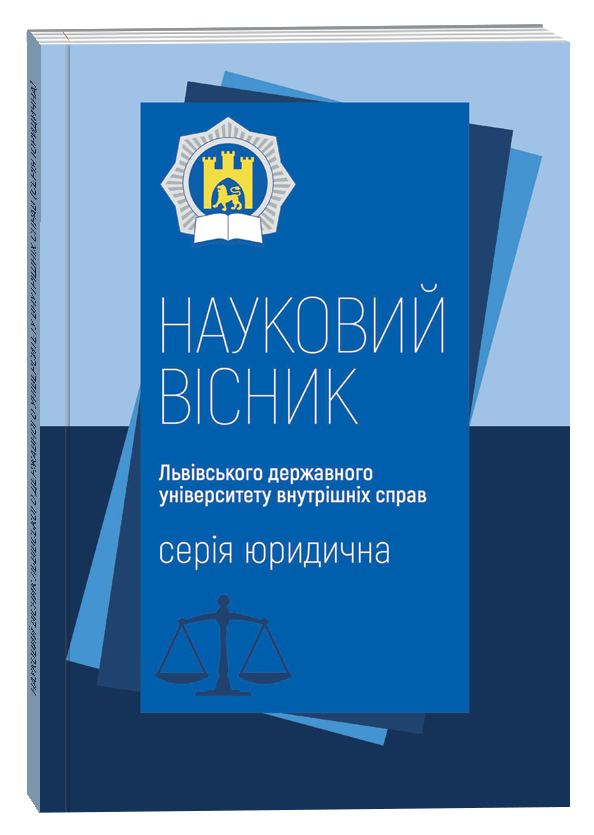THEORETICAL AND LEGAL PRINCIPLES OF ELECTRONIC LITIGATION IN CIVIL PROCEDURE IN UKRAINE: CONTEMPORARY CHALLENGES
DOI:
https://doi.org/10.32782/2311-8040/2025-1-1Keywords:
litigation, electronic litigation, law, judicial system, digitalization, digital technologies, contemporary challenges, civil procedureAbstract
Abstract. In the context of proving the relevance of the research topic, it has been established that electronic litigation facilitates the reduction of bureaucracy, shortening of case processing time, and increasing the transparency of judicial processes. We have proven that in the context of global digitalization, the development of electronic litigation becomes a necessary step for modernizing the legal system and ensuring its compliance with contemporary requirements. The structure of the research involved a review of literature on the topic, presentation of the purpose and methods of research, highlighting key results, and forming our conclusions. Recognizing the scientific achievements of other researchers, it has been established that due to increased digitalization, issues related to the theoretical and legal foundations of electronic litigation in civil procedure in Ukraine remain relevant. The research methodology involves the application of methods such as induction and deduction, comparison and systematization, synthesis and analysis, morphological analysis, tabular and graphical, and abstract-logical. As a result of the research, key characteristics of electronic litigation in civil procedure have been defined. It has been proven that electronic litigation plays a key role in civil procedure, providing increased efficiency and accessibility of judicial services. Meanwhile, it has been determined that with enhanced digitalization, challenges also intensify. Key challenges for electronic litigation in civil procedure have been singled out. A critical obstacle remains the issue of inadequate training and education of judges and court staff to work with the latest digital technologies, which can lead to low efficiency in the use of electronic systems. Overall, it has been established that the current state of electronic litigation today is characterized by significant progress and active implementation in many countries around the world. Further research is needed to analyze international practices in the development of electronic litigation in civil procedure.
References
Чудик Н. І. Ефективність функціонування правосуддя та судова реформа в Україні. Україна в умовах реформування правової системи: сучасні реалії та міжнародний досвід : матеріали ІІІ Міжнар. наук.-практ. конф. (м. Тернопіль, 20–21 квіт. 2018 р.). Тернопіль : ТНЕУ, 2018. С. 142–143.
Смокович М. І. Адміністративна юстиція та електронне судочинство в Україні. Прикарпатський юридичний вісник. 2020. Випуск 4 (33). С. 77–81.
Сердюк Л. Р. Організаційно-правові основи впровадження електронного судочинства в Україні : дис. на здобуття наук. ступеня кандидата юридичних наук за спеціальністю : 12.00.10 «Судоустрій; прокуратура та адвокатура». Приватний вищий навчальний заклад «Львівський університет бізнесу та права», Львів, 2017. 166 с.
Сергєєв К. Вимоги до законодавчої діяльності в епоху гіпердинамічного розвитку інформаційних технологій. Підприємництво, господарство і право. 2019. № 10. С. 137–145.
Рудюк В. С. Діджиталізація в сучасному судочинстві. Філософські та методологічні проблеми права. 2020. № 2 (20). С. 82–85.
Русанова І. Cучасні проблеми запровадження електронного судочинства в Україні. Публiчне право. 2021. № 3 (43). С. 41–49.
Решота В. Проблеми визначення основних понять у сфері здійснення правосуддя. Вісник Львівського університету. Серія юридична. 2016. Випуск 62. С. 119–127.
Політанський В. С. Доктрина поняття електронного управління. Legea si Viata. 2018. № 1/2. С. 98–101.
Погорілецька А. В., Богатирьова М. О. Організаційно-правові аспекти функціонування системи документообігу суду. Юридичний науковий електронний журнал. 2018. № 6. С. 247–250.
Олійничук О., Олійничук Р., Колесніков А. Електронне правосуддя як елемент сучасної системи судочинства. Актуальні проблеми правознавства. 2021. № 3 (27). С. 141–147.
Обрусна С. Ю., Іванова І. В., Чубань В. С. Проблеми адміністративно-правового забезпечення електронного суду в Україні в умовах пандемії COVID-19. Юридичний науковий електронний журнал. 2020. № 4. С. 196–199.
Мильцева В. С. Передумови виникнення електронного правосуддя. Науковий вісник Херсонського державного університету. 2018. Вип. 4. Т. 2. С. 118–120, с. 119.
Кушакова-Костицька Н. В. Електронне правосуддя: українські реалії та зарубіжний досвід. Юридичний часопис Національної академії внутрішніх справ. 2013. № 1. С. 103–109.
Круковес В. В. Міжнародні стандарти цивільного судочинства: поняття та ознаки. Вчені записки ТНУ імені В. І. Вернадського. Серія : юридичні науки. 2020. № 2. Том 31 (70), ч. 1. С. 90–94.
Кошман А.В. Перспективи застосування дистанційного правосуддя після пандемії COVID-19. Наукові записки НаУКМА. Юридичні науки. 2022. Т. 9–10.









